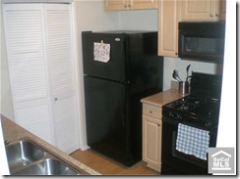There was a recent article posted on MSN about mortgage companies working with FB’s to save their homes from foreclosure. This particular article is most likely part of a public relations campaign from the lending industry to show they are working on the problem. They are bracing themselves for the inevitable congressional hearings which will happen next year. There is nothing quite like an election year crisis to bring out congressional grandstanding by our leading politicians. But I digress… the MSN article got me thinking about what really could be done about the foreclosure problem.
I have written in several posts about the serious foreclosure problem looming as several trillion dollars of mortgages reset to higher payments over the next 5 years. There is no way to effectively restructure payments when a borrower cannot even afford to pay the interest on the debt. Lenders cannot lower interest rates to near zero because then they will lose money on the loan. Any borrower who thinks the lender is actually going to forgive the debt and allow them to keep their home is really living in a fantasy world (I would wager many FBs believe this). Lenders will not take a loss on a property loan and allow borrowers to keep the home: it’s as simple as that.

As much as it pains me to write this, there is a short to medium term solution to the foreclosure problem: convert part of the mortgage to a zero coupon bond. For those of you not steeped in finance, a zero coupon bond is a bond which does not make periodic interest payments. Think of it a zero amortization loan. You don’t pay either the interest or the principal, and both accumulate for the life of the loan. The loan would be due upon the sale of the house.
Here is how it would work for our typical homedebtor: Assume our financial genius utilized 100% financing and took out a $500,000 interest-only mortgage with a 2% teaser rate that is due to adjust to 6%. Let’s further assume his real income (not what he reported on his liar loan) could support a $1,500 payment on a $250,000 conventional 30-year mortgage at 6%. The bank could convert $250,000 to a conventional mortgage, and convert the other $250,000 to a zero coupon bond at 6% due on sale. The homedebtor can now make their payment, and they get to keep their house. But here is the catch: when they sell their house, they will owe the bank a lot of money. If they sell the house in 20 years, they will owe $800,000 on the zero coupon bond note. In other words, all the equity gain on the value of the home will go to the bank.
.
{adsense}
.
This would solve a multitude of problems: First, it would provide a mechanism whereby people who were victims of predatory lending could keep their homes. This would make the homedebtor happy, and it would get government regulators out of the bank’s business. Second, it would make the banks more money in the long run because they are still making their interest profit even if they don’t see it until the homedebtor sells the home (many may not be aware of it, but lenders book income on the increase in principal on a negative amortization loan). Third, since foreclosures would be the primary mechanism facilitating the crash, it would keep home prices from crashing by reducing the number of foreclosures.
Sounds like a panacea, doesn’t it? There are some problems.
The first problem will become apparent when people start selling their houses. People are greedy. They won’t want to give the bank all their equity when they sell. They will conveniently forget the debt relief and avoiding foreclosure and all the problems they had earlier. All they will see is that they sold the house for a lot more than they paid for it, and they did not make any money. And what happens when the appreciation does not match the term of the note? Do they do a short-sale 20 years down the line? This will cause a huge uproar and more calls for congressional intervention. In other words, for everyone involved the day of reckoning is merely delayed, not avoided.
Second, it does nothing for the affordability problem. If prices do not crash, a great many people really will be priced out forever. To solve this problem, banks will make zero coupon bonds available to everyone, and eventually everyone will have them. Think about where we will be then: we will be a society of homedebtors who have collectively agreed to give all our equity to the bank for the pride of ownership. Starts to sound a bit like Pottersville from It’s a Wonderful Life. Is that the way we all want to live?

Third, The zero coupon bond solution would effectively eliminate the move-up market because you won’t have any equity to take with you from house to house. Unless you save money or get a big raise so you can afford a larger payment, you can’t buy a more expensive home. This would result in a dramatic flattening of prices. In other words, the low end would be supported at inflated levels while the high end would stagnate or decline.
Fourth, Based on the problems above, it will be difficult to find a new equilibrium in prices. How would people figure out how much anything is worth? How would all price ranges be supported equally? Small changes in the interest rate on the zero coupon bond can make the difference between hundreds of thousands of dollars at the time of sale, particularly on a long-term hold. Does anyone think this will turn out in favor of the borrower? I suspect we would see a lot of short-sales as the banks graciously agree to take all the gains and forgive the rest of the debt. This takes us back to our first problem with angry, greedy sellers.
Finally, I think this is only a short to medium term solution to the foreclosure problem. For as much as we are addicted to credit in this country, there is a point where people will say “enough is enough.” When a house fails to have any investment value, people will not be so excited about home ownership. People can blather on about pride of ownership all they want, but people want to make money on selling their houses. Inflated valuations are only supported by greed. If home ownership becomes less desirable, prices will end up falling back to their rental equivalent value because the demand will not be there. In the long run, we would end up with prices where they should be anyway, it would just be a much more prolonged and painful journey. Does anyone want to experience what the Japanese went through?
When faced with the prospect of more than a million foreclosures, some Wall Street genius (I am being facetious) is going to come up with a solution very similar to what I just presented. To be honest, zero coupon bond structures and other exotic financing terms are quite common in complex real estate deals like the ones I see on a daily basis in my line of work. Exotic loan terms are the exclusive purview of sophisticated investors who understand what they are doing. They are not intended for consumption by the general public. Given the profusion of interest-only, and negative amortization loans in the market today, is it any surprise we have such a big mess now?
.









